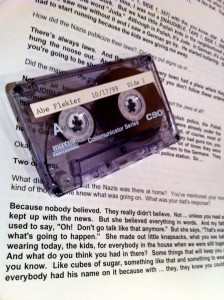 Jessica Rockhold, Director of School Programs and Teacher Education at the MCHE, looked up at me from her desk. “You have a word?” she asked. Usually the reason I go find her is so she can help me figure out a word that I can’t decipher. “Well…” I said. “It’s actually a sentence.” We sat down next to the boom box and I played the five-second indecipherable sentence. I rewound it and played it again. We stared at each other and Jessica started to laugh. The only words we could make out were Czechoslovakia somewhere in the middle of the sentence and Stuttgart at the end. It was, ironically, the English in between that we couldn’t make out. Eventually we figured out the words and entered them in the transcription.
Jessica Rockhold, Director of School Programs and Teacher Education at the MCHE, looked up at me from her desk. “You have a word?” she asked. Usually the reason I go find her is so she can help me figure out a word that I can’t decipher. “Well…” I said. “It’s actually a sentence.” We sat down next to the boom box and I played the five-second indecipherable sentence. I rewound it and played it again. We stared at each other and Jessica started to laugh. The only words we could make out were Czechoslovakia somewhere in the middle of the sentence and Stuttgart at the end. It was, ironically, the English in between that we couldn’t make out. Eventually we figured out the words and entered them in the transcription.
Before I started working at this internship, I became quite familiar with transcribing from a series of German letters as part of the online project at trugundschein.org. The palaeography skills I used for the letters are quite different from the skills I am learning now. With the letters, I had to study the old German script, and once I knew how the letters were formed, I could read the whole collection with few difficulties. With the interviews, I have to learn a new “script” each time I start with a new interview. Each person has their own cadence, different accents, and different ways of pronouncing certain sounds. While the letters are almost entirely in neat, full sentences, the interviewees pause, start and restart sentences, and change direction mid-sentence or even mid-word.
Sometimes working on these transcripts makes me feel like a detective. Unlike the letters, when the interviewee mentions a Polish town, I don’t have the spelling available, and so I need to find the town to confirm the spelling. Sometimes, if it’s an option, we can simply contact the interviewee. Other times the interviewees will drop words in German (or Yiddish, or Hungarian, or Polish, or Hebrew). Have I mentioned that Google Translate is quite useful? My background in 1930s German history has also been very useful because of the many Holocaust-related terms mentioned in the interviews. I am now well acquainted with how much knowledge and work goes into creating accessible documents for researchers. Unfortunately, despite all of our successes, some spots simply have to be labeled [UNCLEAR] in the transcript.
